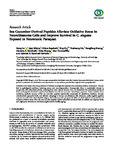Sea Cucumber-Derived Peptides Alleviate Oxidative Stress in Neuroblastoma Cells and Improve Survival in C. elegans Exposed to Neurotoxic Paraquat
| dc.contributor.author | Lu, M | |
| dc.contributor.author | Mishra, A | |
| dc.contributor.author | Boschetti, Chiara | |
| dc.contributor.author | Lin, J | |
| dc.contributor.author | Liu, Y | |
| dc.contributor.author | Huang, H | |
| dc.contributor.author | Kaminski, CF | |
| dc.contributor.author | Huang, Z | |
| dc.contributor.author | Tunnacliffe, A | |
| dc.contributor.author | Kaminski Schierle, GS | |
| dc.date.accessioned | 2021-04-20T15:39:11Z | |
| dc.date.available | 2021-04-20T15:39:11Z | |
| dc.date.issued | 2021-04-19 | |
| dc.identifier.issn | 1942-0900 | |
| dc.identifier.issn | 1942-0994 | |
| dc.identifier.other | ARTN 8842926 | |
| dc.identifier.uri | http://hdl.handle.net/10026.1/17057 | |
| dc.description.abstract |
<jats:p>Oxidative stress results when the production of oxidants outweighs the capacity of the antioxidant defence mechanisms. This can lead to pathological conditions including cancer and neurodegeneration. Consequently, there is considerable interest in compounds with antioxidant activity, including those from natural sources. Here, we characterise the antioxidant activity of three novel peptides identified in protein hydrolysates from the sea cucumber Apostichopus japonicus. Under oxidative stress conditions, synthetic versions of the sea cucumber peptides significantly compensate for glutathione depletion, decrease mitochondrial superoxide levels, and alleviate mitophagy in human neuroblastoma cells. Moreover, orally supplied peptides improve survival of the Caenorhabditis elegans after treatment with paraquat, the latter of which leads to the production of excessive oxidative stress. Thus, the sea cucumber peptides exhibit antioxidant activity at both the cellular and organism levels and might prove attractive as nutritional supplements for healthy ageing.</jats:p> | |
| dc.format.extent | 1-14 | |
| dc.format.medium | Electronic-eCollection | |
| dc.language | en | |
| dc.language.iso | en | |
| dc.publisher | Hindawi Limited | |
| dc.subject | Animals | |
| dc.subject | Neuroblastoma | |
| dc.subject | Oxidative Stress | |
| dc.subject | Paraquat | |
| dc.subject | Peptides | |
| dc.subject | Sea Cucumbers | |
| dc.subject | Survival Analysis | |
| dc.title | Sea Cucumber-Derived Peptides Alleviate Oxidative Stress in Neuroblastoma Cells and Improve Survival in C. elegans Exposed to Neurotoxic Paraquat | |
| dc.type | journal-article | |
| dc.type | Journal Article | |
| plymouth.author-url | https://www.webofscience.com/api/gateway?GWVersion=2&SrcApp=PARTNER_APP&SrcAuth=LinksAMR&KeyUT=WOS:000664852900002&DestLinkType=FullRecord&DestApp=ALL_WOS&UsrCustomerID=11bb513d99f797142bcfeffcc58ea008 | |
| plymouth.volume | 2021 | |
| plymouth.publication-status | Published | |
| plymouth.journal | Oxidative Medicine and Cellular Longevity | |
| dc.identifier.doi | 10.1155/2021/8842926 | |
| plymouth.organisational-group | /Plymouth | |
| plymouth.organisational-group | /Plymouth/Faculty of Science and Engineering | |
| plymouth.organisational-group | /Plymouth/Faculty of Science and Engineering/School of Biological and Marine Sciences | |
| plymouth.organisational-group | /Plymouth/REF 2021 Researchers by UoA | |
| plymouth.organisational-group | /Plymouth/REF 2021 Researchers by UoA/UoA06 Agriculture, Veterinary and Food Science | |
| plymouth.organisational-group | /Plymouth/Users by role | |
| plymouth.organisational-group | /Plymouth/Users by role/Academics | |
| dc.publisher.place | United States | |
| dcterms.dateAccepted | 2021-03-30 | |
| dc.rights.embargodate | 2021-4-22 | |
| dc.identifier.eissn | 1942-0994 | |
| dc.rights.embargoperiod | Not known | |
| rioxxterms.versionofrecord | 10.1155/2021/8842926 | |
| rioxxterms.licenseref.uri | http://www.rioxx.net/licenses/all-rights-reserved | |
| rioxxterms.licenseref.startdate | 2021-04-19 | |
| rioxxterms.type | Journal Article/Review |


